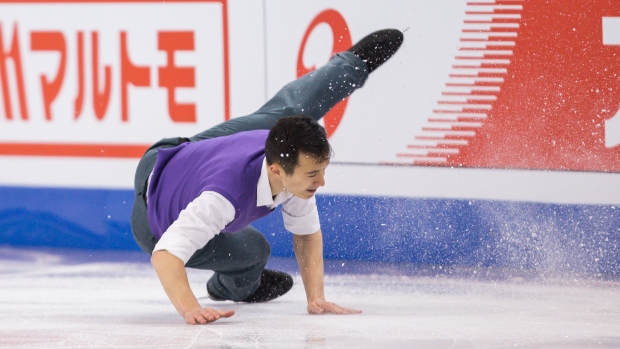Apr 3, 2016
Canada's Chan admits to emotional outburst
Patrick Chan called the world championships another step in his comeback. A medal, he said, would be bonus. But moments after the Canadian's sloppy free skate plummeted him to fifth place, his emotions spilled out into the bowels of TD Garden.
The Canadian Press

BOSTON - Patrick Chan called the world championships another step in his comeback. A medal, he said, would be bonus.
But moments after the Canadian's sloppy free skate plummeted him to fifth place Friday night — Chan's worst world finish since 2009 — his emotions spilled out into the bowels of TD Garden.
"Oh yeah. You could hear me down the halls for sure, from in the change-room," he said, somewhat sheepishly, the next day.
"I wasn't yelling at anybody in particular. Just yelling at myself. Just letting steam out. When you've had the taste of what it feels — not the medal, not the winning — but what near perfection feels like, you're always striving for that. . . I was very far from that. That was the main frustration."
The three-time world champion met with the media a day after his free skate, and hinted there might be some changes next season.
When asked about his choreographers — his two programs this season were choreographed by David Wilson — Chan said "It's in discussion.
"It's really up in the air right now. My behaviour (Friday) was. . . I was extremely frustrated and I think it hurt a lot of people maybe. Luckily Kathy (Johnson, his coach) has been there through thick and thin and she knows who I am. We're in discussion right now as to who can give me the best tool for what I'm looking for which is, again, stripping down the choreography a little bit and bringing it back to the pureness of skating.
"Maybe David is capable of doing that, maybe Jeff (Buttle), or even Julie (Marcotte). It's too soon to say. I wouldn't say it's one person."
Wilson is also Javier Fernandez's choreographer, and his thoroughly entertaining Frank Sinatra free skate Friday not only earned the Spaniard gold but sent the TD Garden crowd into a frenzy.
Chan hasn't seen it yet.
"Of course I'm way too sour right now to watch it," Chan said, laughing. "I see it on Facebook of course, but I keep scrolling. I don't want to watch it yet."
Chan is also playing catch-up in a men's field that has hoisted the bar sky-high in his absence. Fernandez, Japan's Olympic champ Yuzuru Hanyu, and world bronze medallist Jin Boyang have stacked their programs with quadruple jumps.
Chan had just three quads this season, one in the short program and two in the long.
"I will say that maybe adding a fourth — two quads in the short, or maybe three quads in the long — looks like that’s what needs to be done," he said, adding he'll continue to work on his quad Salchow this summer.
And while Chan can reel off huge textbook quads with the best of them, he believes in quality over quantity. He's argued the emphasis on the big jumps is taking away from the other elements of the sport.
"I feel like I'm a broken record," he said. "I feel like I'm just repeating myself, all lonely."
The challenge, he said, is to mix them into the choreography in a way he feels comfortable. He used French ice dance champions Gabriella Papadakis and Guillaume Cizeron as an example.
"I want to take a program like they have where from beginning to end it doesn't stop. You don't get any interruption of that world they bring you into," Chan said. "I want to bring that and add technical to that.
"That's the part where it becomes challenging — not to let the choreography get interrupted by the jump. Incorporating everything together is key. I hope to be able to do that. It's not an easy feat."
Skate Canada's high performance director Mike Slipchuk pointed out that Chan "slowly is upping his ante," noting that he added a second triple Axel to his long program this season.
"It's a two-year plan and we have to keep that in mind," Slipchuk said. "Definitely he's shown that he's in the running, he's in the pack, and he's one of the top guys out there. Next year will be another year, and a needed increase in a lot of the technical areas."
Chan's ultimate target is the 2018 Pyeongchang Olympics, and perhaps some redemption for his heartbreaking silver medal in Sochi.
Asked if he believes he can rise to the level of Hanyu and Fernandez, Chan said "no doubt about that."
"I know that if I can skate my very best. . . if I can have a little more time to just get used to being in my body on the ice in front of a crowd in a competitive scene where I can do both a good short program and a good long program, the sky's the limit."
